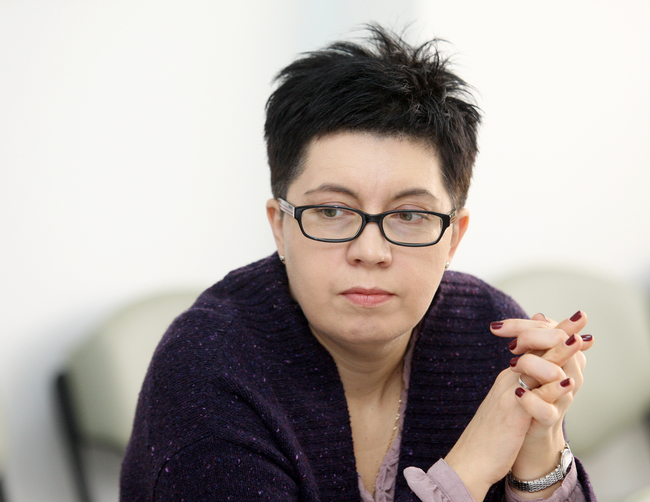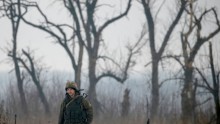The German Foreign Ministry can see no departures from Berlin’s official position in the comments of Germany’s Ambassador to Ukraine Ernst Reichel on the possibility of elections in the Donbas before the withdrawal of Russian troops. Reichel’s statement evoked a bitter response in Ukrainian society and political circles. A group of MPs with Hanna Hopko, chairperson of the Parliamentary Foreign Affairs Committee, at the head strongly condemned Reichel’s position and even called for boycotting the embassy reception to mark the 25th anniversary of diplomatic relations. On the contrary, some experts and politicians have seen nothing objectionable in the German ambassador’s words, for he allegedly said no more than is written in the Minsk Accords. “Holding elections on the occupied territory in the presence of foreign occupational troops is absolutely out of the question,” President Petro Poroshenko of Ukraine said. We asked political scientist Viktoria PODHORNA what she thinks of this situation.
“I recently read an interview with German journalist Boris Reitschuster who had worked in Russia for 16 years but left that country in 2011 for political reasons and came back to Germany. He described very clearly Germany’s current policy towards Russia. It is no secret that Russia is waging a ‘hybrid war,’ also against Europe on the information front, and there is sort of cooperation as part of this ‘war,’ which is in reality a banal bribe on the part of the Kremlin. This journalist says that the situation in Germany is not simple from this angle because German elites are not fully aware of being the object of a ‘hybrid war.’ Accordingly, they mostly see the situation in Ukraine with Russian, not Ukrainian, eyes.
“So, on the one hand, the German ambassador’s statement reflects the Kremlin’s ‘hybrid war’ against the European Union, particularly Germany. But, on the other, it shows that our leadership, especially diplomacy, has no strategic vision. We are still unable to take a clear and tough position which Europe could accept unanimously. Yes, many people in the West recognize the right of Russia to have its own interests, but Ukrainian diplomacy must see to it that Ukraine’s right to have its interests is also recognized. For example, very few are drawing a parallel between Putin’s current regime and Hiller’s Nazi Germany. The same German journalist says he is trying to explain to the local elite that they are taking a childish attitude to Russia. There are just a few people there, who speak of parallels between Putin and Hitler.
“The German ambassador’s statement is either a complete failure to understand the situation or the intention to take into account different interests – what they call Realpolitik. In other words, they are trying to find a place for Russia in international politics, even though the Kremlin has in fact broken the hard-and-fast rules of international law. Unfortunately, our elites do not have a consolidated proactive position on or a strategic vision of how to tackle the problems of the Donbas and Crimea. Some experts, for example, Yevhen Marchuk, express their opinions, but the leadership does not heed and is unable to make use of them.”

Photo by Mykola TYMCHENKO, The Day
Can the German ambassador’s statement be exploration of the ground for further attempts to prompt Ukraine to implement the Minsk Accords?
“Unfortunately, the impression is that, owing to her consistent and tough position, Russia is achieving her goal, although we know that she is an aggressor and a criminal. She is in fact forcing the West to reckon with her. The current leadership of Ukraine has been repeatedly cautioned against the formats in which we will not be active players. That’s just the case. What is the ‘Minsk format’? It is rather a flexible format – the participants may try, one way or another, to foist federalization on us. If we wait for somebody else to solve our problems, we will lose.”
There are different opinions about the Crimea and Donbas strategy. Some come out for the Minsk Accords, some for the so-called blockade, and some for recognizing the seized territories as temporary occupied. What do you think?
“It is difficult for me to give advice because one must tackle this constantly and profoundly. I can express my personal attitude. Unfortunately, we have lost too much time (25 years) to be able to integrate these regions in some way. They in fact came under full control of the Party of Regions and local clans in the late 1990s – the early 2000s. Latent separatism existed at the time, too, but very few paid attention to that. For example, Yushchenko did nothing to solve this problem. Now, 25 years on, it is very difficult to address the problem of regaining these territories. I even suggested in 2014 that a referendum be held and we peacefully resolve this problem – either we go to Europe together or we part. I think we need a transitional period today, i.e., we should call the war a war and pronounce these territories temporarily occupied. We should be not abrupt and unpredictable but persistent and consistent.
“What else will make it difficult to integrate the temporarily occupied territories? The point is that we will need to carry out reforms there, but the current leadership is unable to do so even on the free territory. How can we convince the people there, in fact paternalists, that it is better here if we are in an economic crisis and carry out no reforms? If we do not change ourselves but still integrate the seized territories, this will be an additional trump card in the hands of Russia.”
Let’s get back to our foreign policy. In what condition is the Ukrainian school of diplomacy today?
“As a political scientist, I must say that the state of our diplomacy only proves the weakness of Ukrainian statehood. It performs some of its functions, but can see no strategic victories. Naturally, there are some strong diplomats, but there must be a systemic policy in this field. We are in bad need of strong diplomacy today. Of course, Kyiv had its own school of diplomacy even in the Soviet era, but it was not self-sufficient and was under control of Moscow where the most talented ones were invited to. We have restored, more or less, and continue to improve the army, but diplomacy still remains a big problem. A diplomat needs to be trained very seriously. Incidentally, diplomacy is not necessarily a matter of politics – it can be indispensable in the expert milieu, in culture, etc. And this is also a problem. It looks as if our state is a thing apart – isolated from society. The state is a so bad structure that the best people remain undemanded and uninvolved.”
Incidentally, we recently watched dozens of Ukrainian politicians attend the inauguration of US President Donald Trump and the ensuing National Prayer Breakfast in Washington. What does it mean? Does this help them in any way?
“My question is: did they travel there in such a large number as tourists or to establish contacts? Just to come to the inauguration or the breakfast means nothing. If you want your opinion to be heard, you must make contacts for years on end – all the more so that the US is a global superpower to which hundreds of politicians from dozens of countries come to attend events like this. If you go there, there must be some sense in it, otherwise it is just populism and political tourism. What is the result of their trip, what positions did they put across? I think the US administration might have not even noticed such a big ‘landing party’ from Ukraine. On our part, it is sort of a ‘childish policy.’
“The situation also shows that our parties are political clubs to serve certain politicians. A party must have an ideology and show professionalism in its work. This also means that there is a considerable shortage of true experts, ideas, and decisions – instead, political publicity and hype hold sway. And even if there are some oases of systemic experts, they remain unnoticed. By contrast, this is the basis of high-quality politics in normal countries.”
I recently read an interview with political consultant Serhii Haidai, in which he speaks, easily enough, about working with various parties and politicians. I also happened to hear this kind of reasoning from other political scientists. But I’ve always wanted to ask if these people must bear responsibility for “molding” politicians and “assigning” ratings to them. For it is these politicians and parties that in fact drove the country to war.
“Of course, they must be responsible. For example, in Europe and America, the people who wish to work on the consulting market are to sign special documents that envision social responsibility for the advice they give to politicians. It is normal in Western countries to regulate the professional activity of political consultants. Yet the events during Trump’s election campaign and what is now going on in Europe show the erosion of principles. Accordingly, the West is also facing the question of how to battle populism, the post-truth, and manipulations. We don’t have this kind of documents at all. There were attempts to form professional communities, with no apparent success. There were always the people who worked outside the communities and sold themselves to one political force or another.
“Incidentally, the West also has such thing as adherent to certain principles. It is difficult to imagine people in the US, who work in the Democratic or Republican parties without sharing their principles. The same applies to Europe. Those who switch sides every now and then are self-advertisers, not the people who draw up programs and lay down principles. In our country, instead, spin doctors just seek speedy results for the client. On the whole, this results from the nature of the political system in Ukraine. We have no true political parties, and spin masters are doing their best to prevent them from emerging.
“I’ve had extensive practice in this sphere. I always quitted the job if my recommendations were not accepted. I’ve never worked with the political entities that ran counter to my principles. But, unfortunately, there are not many people like this on our market. Therefore, how to establish the principles of political consultants’ responsibility to clients and society in Ukraine is still an open question. Journalists should always raise these questions.”
A question of early elections has been raised in Ukraine from time to time. Is this realistic in the near future?
“I can see so far no real signs of the upcoming early parliamentary elections, although a lot of political parties are interested in this. Were it not for the Donbas war and a difficult international situation, this would be a good thing. The rotation of political elites is always topical, and elections are one of the instruments.
“The existing coalition is rather closely knit with mutual interests. Accordingly, neither the Petro Poroshenko Bloc nor, moreover, the People’s Front which has a zero rating, are interested in early elections. And the wishes and possibilities of Yulia Tymoshenko, whose ratings and, hence, interest in the elections, are rising, are not sufficient for this. Only geopolitical factors can lead to an early election if Poroshenko gives in to some demands from abroad. But he has consolidated power in his hands. He managed to do so even better than Yanukovych who triggered mass-scale protests. Yet consolidation of power is a dangerous policy, especially if it is not aimed at protecting national interests. This causes the ever-growing isolation and apathy of society. A very large number of intelligent people are emigrating from this country. Ukraine is Europe’s top country by this indicator. Emigration is people’s reaction to the current leadership’s policy. Poroshenko is shaping his policy on the basis of control, whereas this should be done on the basis of influence.”







